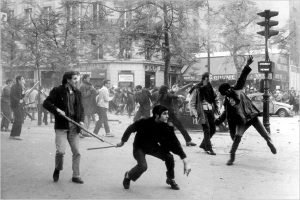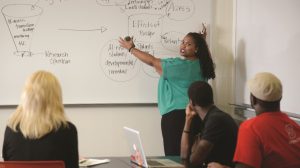University Pedagogies 2: Institutional Framework for Teaching and Tutoring / Spring 2017 / Teacher: Camilla Kronqvist
Group Blogpost: ’Student as Producer, Teacher as Producer’
Jason Finch, Emil Kaukonen, Marta Olszewska
2 June 2017
The Shifting Role of Universities
The changing environment of universities is leading to changes in the student/teacher relationship. Universities in 2017 exist in the context of the prevailing opinion in society and the public debate, sometimes labelled ‘neo-liberal’, in which everything is supposed to act like a market. Since the 1980s this has replaced a view of university funding based, broadly, on state planning (we need so many engineers and so many arts graduates, so we will fund those portions of the university accordingly) with one based on the idea that everyone must sell what they have to sell and compete with others in the same marketplace. This applies both to researchers within universities and to the universities themselves as parts of a global knowledge market (Hall, 2010).
The general trend within higher education during the last few decades has undeniably been a shift towards trying to meet the needs of the marketplace on a state and global scale, not least with regard to the internal organization of universities (Taylor and de Lourdes Machado-Taylor, 2010). The emphasis for both student and teacher has shifted so that each is judged according to measures of productivity.
Members of our group on the course ’University Pedagogies 2: Institutional Framework for Teaching and Tutoring’ have situated our own experiences in the context of our assumption that there has been a general change in society and in political discussion over the past few decades. These thoughts have a clear relevance to the public debate.
All That Matters Is Production (?)
Let us imagine a situation when a PhD student gets a funding within a project. The idea of doing research and being paid for this effort sounds appealing, to say the least. It sounds like a dream job. Perhaps to those whose thesis research topic falls within the scope of the project or at least overlaps with it: for them, it is a definite ’yes’. For others, the experience can leave a bitter taste. It can include publishing articles which fulfill the objectives of the project, objectives which have been put in place by the PI of the project and approved by an external funding body, but don’t serve the needs of the PhD student. This may lead to a lack of personal motivation, since the student is focusing on project work and not his or her own interests. It can be impossible for the student to do his or her own chunk of work. However, does this matter? The papers are being produced anyway… And the research plan of the PhD student is essentially irrelevant, as long as he or she produces papers on time and graduates (as yet another output of the university system).
In varied ways and to varied extents university teachers may question and even in some cases resist the situation in which we are operating. This bears some resemblance to the model of the teacher as dissident, an oppositional actor operating under the radar within the system, which has been proposed by Seth A. Agbo (2010). The dissident is often viewed as someone whose activity is aimed at the destruction of the system in which they operate. Perhaps the dissident could be viewed more positively by those able to modify the system on a larger scale as a productive figure, as someone with insights to contribute which could rehumanize the system without attempting to turn back the clock to the past. A teacher’s productivity could include a productive level of dissidence.
Allied to this, if the number of PhD students that a docent or professor can take on is very limited, then researcher education is problematic. The lead researcher can put no time into researcher education. He or she can only use the junior researcher as a resource to do the portions of the job which the senior researcher would prefer not to do. The junior researcher, meanwhile, has to accept this particular market as the situation in which he or she is now operating. The alternative to becoming a course assistant with plenty of workload on the shoulders (read: accepting the situation) is leaving the academic profession. Thus a by-product of the new university system are lecturers without the proper ‘lecturer’ tag. In this sort of case, the demand for productivity can have a highly negative outcome, demoralizing and even driving from the profession people who are well suited to it.
Universities are now forced to produce potential employees to fill in the market gaps (Neary and Winn, 2009). They need to adapt their teaching methods and material to fulfill the job market’s expectations (Offutt, 2014). But the question remains: should the graduates be specialised narrowly in one topic that they have explored to exhaustion or should they have a broad knowledge about generic concepts and the ability of finding more information upon request (Meyer, 2014)? Should universities teach students adaptability? History shows that universities seem to be capable of being flexible at all times, mimicking and following contemporary economic and political trends.
Pecunia Non Olet: The Money Aspect
Additionally, when thinking about both the student as producer and the teacher as producer, researcher education faces an issue of politics. These touch primarily on financial aspects of universities. For example, take a subject in Åbo Akademi University’s FHPT which, in practice, gets one funded place a year for a PhD student from ÅA irrespective of how many good people come along. More and less competitive individual years of students will exist, but this reality will not be reflected in the numbers admitted to PhD studies, and there will be some years in which good candidates can lose out. We can see the same difficulty mirrored at the level of external funding applications to, for example, specific research councils at the Academy of Finland. The Academy has a very limited number of places in Culture and Society, for example, available each year, and in practice the allocation of funding will be determined by quotas: Helsinki needs to get so and so many; there need to be so many historians. And so on.
Clearly, when external project funding is a big part of how researcher education, teaching etc. is organized, this has an impact on how people view themselves as researchers. The possibilities of PhD students to learn things can be very limited. They have to accept the system as it is, and they have to develop within it. This can seem like a ‘take it or leave it’ approach on the part of university managers, who are themselves forced to take or leave the national higher education system that they are being asked to manage. In either case, that of young PhD researchers and established administrators, there will be others waiting in line to accept whatever one protests against. Need the situation be passively accepted? There are negative consequences for national higher education productivity which are introduced by the system’s demands for output figures. Highly qualified graduates and researchers will leave this university for more stable and well-paid positions elsewhere. This could be outside the university in the Finnish private sector, or by finding better university conditions either elsewhere in Europe or beyond. It is merely a manufacturer-like illusion that all the parts can be swapped without any harm to the system. There seems to be the potential – and perhaps the demand – for a type of education that more realistically views the situation in which we are, where both students and teachers are producers.
Intellectual Manufacturing
In the current context being described here, the person starting a career as a university researcher and teacher faces production objectives. Teaching takes so many hours, so how are you to write articles? You have to generate a thesis, or a certain number of articles which will be accepted by the right journals; you have to process a certain number of students. You are described as a teaching assistant when in practice you are taking on the full responsibility for creating and assembling the course material, teaching and grading a whole lecture course. Note the words in italics – do they resemble a factory in any way?
Examples of materialisation and productisation at the universities seem to be endless and experiences of them are varied but seem to be shared by all of us. For instance, it can be reading and grading Master’s theses always in conjunction with the supervisor of the theses; or teaching a great deal alone that was nominally the responsibility of the project leader who received the funding which was paying the group member’s salary. In both cases the PhD student is, in a sense, used as a production unit, handling work that salaried employees find time-consuming and unmotivating.
[above: Paris, 1968]
Conclusions
This is the academic world we all operate in and have to agree to its terms, if we want to remain in academia. The relationship is a contractual one, it seems. There is no realistic prospect of turning 2017 into 1968. It’s necessary to sell yourself; to become famous (if possible) and recognised as an academic. Pitching for PhD funding in the manner of a salesman touting for business is currently the way to go. If you applied for research funding and didn’t get it, you lost in the beauty pageant.
[above: a university classroom, 2017]
Disclaimer
These reflections on personal experience happen in dialogue with the evidence and methodologies found in research literature (see References). Emphasis here has been on the person at the outset of the academic career, who is operating as both student and teacher. The same approach could be taken to people at other levels of the academic career, from undergraduate student to professor. Thus, it is a person-led approach. Naturally, there might be points to challenge it. After all, it is based on assumptions that the university world has broadly changed in the way described in the first paragraph (from top-down to marketization).
List of references
Agbo, Seth. A. 2010. ‘The Cultural Politics of Educational Inequality: Discarding the Prevailing Eurocentric Formulations of Academic Failure’. In Claes, Tom; Preston, David Seth (Eds.). 2010. Frontiers in Higher Education. Amsterdam: Rodopi. 7–24.
Hall, Philippa. 2010. ‘Privatisation and the Transformation of Higher Education in Nigeria since 1986: An Analysis of Global Inequalities’ in Claes, Tom; Preston, David Seth (Eds.). 2010. Frontiers in Higher Education. Amsterdam: Rodopi.
Meyer, Bertrand. 2014. ’Crossing the Is and dotting the Ts’. Bertrand Meyer’s technology + blog. Available at: https://bertrandmeyer.com/2014/04/29/crossing-the-is-and-doting-on-the-ts/
Naery, Mike and Winn, Joss. 2009. ’The Student as a Producer: Reinventing the Student Experience in Higher Education’ in Bell, Les; Stevenson, Howard; Neary, Michael (Eds). 2009. Future of Higher Education; Policy, Pedagogy and the Student Experience. London: Continuum International Publishing.
Offutt, Jeff. 2013. ’Putting the Engineering into Software Engineering Education’. IEEE Software / Sounding Board, Vol. 30(1):96. Available at: https://cs.gmu.edu/~offutt/rsrch/papers/TeachEngrInSWE.pdf
Taylor, James S.; de Lourdes Machado-Taylor, Maria. 2010. ‘Leading Strategic Change in Higher Education: The Need for a Paradigm Shift toward a Visionary Leadership’ in Claes, Tom; Preston, David Seth (Eds.). 2010. Frontiers in Higher Education. S.l.: Editions Rodopi.
Save
Save



